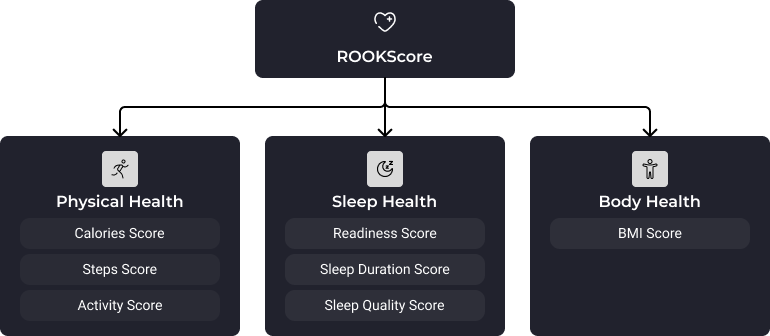Unlocking Wellness with ROOKScore 2.0: Understanding ROOK's Health Score
In today’s fast-paced world, maintaining a healthy lifestyle is more important than ever. At ROOK, we are proud to introduce ROOKScore 2.0, an enhanced version of our health data platform. ROOKScore offers a comprehensive health analysis based on key metrics derived from three major pillars of health: Physical Health, Sleep Health, and Body Health. Each pillar is assessed and scored on a scale from 0 to 100, providing a clear and accurate representation of the user's overall health status.
Data Inputs: The Science Behind ROOKScore
ROOKScore utilizes essential data from three primary sources to assess users’ health:
1. Physical Health
Data Source: Physical health summaries
Goal: To provide an indicator of the percentage of daily activity, calories burned, and steps taken.
Required Data: Age, gender, weight, height.
Activity Score: Based on the amount of physical activity throughout the day, with a focus on meeting daily activity goals.
Calories Score: Based on the number of calories burned, both passively and through activity.
Steps Score: Calculated based on daily step count.
2. Body Health
Data Source: Body health summaries
Goal: To evaluate the user's body mass index (BMI) and overall physical health.
Required Data: Height, weight.
BMI Score: Calculated based on the user’s height and weight.
3. Sleep Health
Data Source: Sleep health summaries
Goal: To assess the quality, duration, and recovery of sleep.
Required Data: Age, gender.
Readiness Score: Indicates how ready the user is for the day, based on sleep quality and overall sleep patterns.
Sleep Duration Score: Measures the duration of the user’s sleep the night before.
Sleep Quality Score: Based on how well the user’s sleep quality was during the previous night.
Output Scores: A Holistic View of Health
ROOKScore provides multiple output scores to offer users a well-rounded picture of their health:
Global Score: An average of the scores from the Physical Health, Sleep Health, and Body Health pillars, providing an overall view of health.
7-Day Score: An average of the global score over the past seven days.
Physical Health Score: Reflects the user's overall physical health, calculated from activity, calories burned, and steps taken.
Body Health Score: Provides an evaluation of the user’s body health based on their BMI.
Sleep Health Score: Reflects the user's sleep health, providing an overall evaluation based on readiness, sleep duration, and sleep quality.
The Science Behind Health Metrics
The reliability of health tests is essential to the effectiveness of any health metric system. By adhering to global health standards set by organizations such as the World Health Organization (WHO), ROOKScore ensures its metrics are relevant, reliable, and aligned with the latest scientific principles in health monitoring.
Understanding the ROOK Score
To illustrate how the ROOK Score works, we use the example of a 28-year-old woman, 165 cm tall and weighing 64 kg, with a mixed lifestyle (partially active and partially sedentary).
Note:
For ROOKScore 2.0 to accurately reflect an individual’s health status, basic demographic data is required. When age, sex, height, and weight are available, the system tailors calculations to the user's profile (e.g., calorie and activity goals adjusted to body size; sleep and HRV ranges aligned to age and sex). If any of these values are missing, ROOK uses general reference values. While the score remains directionally useful, it loses personalization and is internally flagged as calculated with incomplete data.
1. Physical Health
Calories Score:
"calories_score": {
"datetime_string": "2023-12-28T21:07:14.402999Z",
"created_at_string": "2023-12-28T21:07:14.402999Z",
"updated_at_string": "2023-12-28T21:07:14.402999Z",
"score_0_100_int": 80,
"calculated_with_missing_user_info_bool": false,
"missing_user_info_array": []
}
The calories score is based on total calories burned during the day, compared to a target personalized to the user’s demographic profile. A score of 100 means the goal was fully met or exceeded. Lower values reflect a proportion of the target achieved. In this case, moderate calorie expenditure that fell short of the target resulted in a mid-range score.
Activity score
"activity_score": {
"datetime_string": "2023-12-28T21:07:14.402999Z",
"created_at_string": "2023-12-28T21:07:14.402999Z",
"updated_at_string": "2023-12-28T21:07:14.402999Z",
"score_0_100_int": 90,
"calculated_with_missing_user_info_bool": false,
"missing_user_info_array": []
}
The activity score uses a daily minimum target of 30 minutes of activity. Reaching or exceeding that duration results in a score of 100. If the duration is shorter, the score is scaled accordingly. In this example, the user reached approximately 90% of the activity goal, yielding a score of 90.
Steps score
"steps_score": {
"datetime_string": "2023-12-28T21:07:14.402999Z",
"created_at_string": "2023-12-28T21:07:14.402999Z",
"updated_at_string": "2023-12-28T21:07:14.402999Z",
"score_0_100_int": 100,
"calculated_with_missing_user_info_bool": false,
"missing_user_info_array": []
}
The steps score compares the user’s total daily steps against the WHO-recommended baseline of 10,000 steps. In this example, the user reached or exceeded this benchmark, resulting in a score of 100.
Physical health score
"physical_health_score": {
"score_0_100_int": 90,
"calories_score": {...},
"activity_score": {...},
"steps_score": {...}
}
The physical health score combines calorie expenditure, active minutes, and daily steps on a 0 to 100 scale. A score of 90 reflects a strong performance: the user met or exceeded the step goal, completed most of the activity goal (≈30 minutes), and nearly reached the calorie expenditure target. If any sub-score is unavailable, the system averages the available metrics.
2. Body Health
BMI score
"bmi_score": {
"datetime_string": "2023-12-28T21:07:14.402999Z",
"created_at_string": "2023-12-28T21:07:14.402999Z",
"updated_at_string": "2023-12-28T21:07:14.402999Z",
"score_0_100_int": 100,
"calculated_with_missing_user_info_bool": false,
"missing_user_info_array": []
}
The BMI score reflects the user's Body Mass Index, calculated from height and weight and compared to a standard healthy range. A score of 100 indicates the user's BMI falls within that healthy range. In this case, the individual has a BMI of approximately 23.5, which is within the optimal range.
Body health score
"body_health_score": {
"score_0_100_int": 100,
"bmi_score": {...}
}
A body health score of 100 confirms that the user’s BMI is in the healthy range, based on their height and weight profile. For the example (female, 28 years old, 165 cm, 64 kg), the BMI is approximately 23.5, resulting in the highest possible score for this pillar.
3. Sleep Health
Sleep duration score
"sleep_duration_score": {
"datetime_string": "2023-12-28T21:07:14.402999Z",
"created_at_string": "2023-12-28T21:07:14.402999Z",
"updated_at_string": "2023-12-28T21:07:14.402999Z",
"score_0_100_int": 84,
"calculated_with_missing_user_info_bool": false,
"missing_user_info_array": []
}
The sleep duration score compares hours slept against an age-adjusted recommended range. A score of 84 suggests that the user came close to meeting the target but did not fully achieve it.
Sleep quality score
"sleep_quality_score": {
"datetime_string": "2023-12-28T21:07:14.402999Z",
"created_at_string": "2023-12-28T21:07:14.402999Z",
"updated_at_string": "2023-12-28T21:07:14.402999Z",
"score_0_100_int": 80,
"calculated_with_missing_user_info_bool": false,
"missing_user_info_array": []
}
The sleep quality score is based on the amount of deep sleep achieved relative to a recommended target. A score of 80 indicates reasonably good quality—though not optimal—and may reflect brief interruptions, lower efficiency, or slightly reduced deep sleep time.
Readiness score
"readiness_score": {
"datetime_string": "2023-12-28T21:07:14.402999Z",
"created_at_string": "2023-12-28T21:07:14.402999Z",
"updated_at_string": "2023-12-28T21:07:14.402999Z",
"score_0_100_int": 82,
"calculated_with_missing_user_info_bool": false,
"missing_user_info_array": []
}
The readiness score estimates how recovered the user is in the morning, using nighttime heart rate variability (HRV) as the primary input. A score of 82 suggests good recovery—HRV is near the expected range but not at optimal levels. A score of 100 would indicate ideal overnight recovery.
Sleep health score
"sleep_health_score": {
"score_0_100_int": 82,
"sleep_duration_score": {...},
"sleep_quality_score": {...},
"readiness_score": {...}
}
The sleep health score combines duration, quality, and readiness into a single metric on a 0 to 100 scale. A score of 82 reflects solid overall sleep: duration (84), quality (80), and readiness (82) all indicate good but not optimal rest. If any sub-score is missing, the available scores are averaged.
Overall score
"overall_scores": {
"global_score_0_100_int": 90,
"seven_days_avg_score_0_100_int": 84
}
The overall score includes two metrics:
global_score_0_100_int: A snapshot of today’s overall health score across the three pillars—physical, sleep, and body—scaled from 0 to 100. A score of 90 indicates a strong day overall.
seven_days_avg_score_0_100_int: A rolling average for the past seven days. A score of 84 reflects consistent, positive habits. The higher daily score (90) suggests today outperformed the recent trend, indicating improvement or an exceptional day.
Looking Beyond Numbers: The Role of Mental Health
As we move toward a holistic approach to wellness, mental health plays an increasingly vital role in our overall health journey. While ROOKScore focuses primarily on physical health, sleep, and body metrics, we recognize the importance of including mental well-being data. In the future, we plan to integrate more mental health indicators, such as stress levels and emotional well-being, to provide a comprehensive view of a user’s health.
Future Trends in Health Measurement
Health data measurement is rapidly evolving. The rise of personalized health insights, including metrics like glucose levels, hydration status, and body composition, is shaping the future of digital health monitoring. At ROOK, we are already considering how these emerging trends will enhance ROOKScore and help users gain a deeper understanding of their health.
Conclusion: Your Path to Better Wellness
ROOKScore 2.0 is a revolutionary tool that combines scientific principles, health data from wearables, and a holistic approach to give users the insights they need to achieve their wellness goals. By leveraging activity, sleep, and body health metrics, ROOKScore empowers users to make informed decisions about their health, monitor progress, and ultimately achieve a healthier, more balanced life.
At ROOK, we’re committed to creating a personalized health score that evolves with the latest trends and technological advances in the wellness space. Let’s work together to build a healthier future.
Get in touch with us to learn how ROOK can help you unlock the full potential of your health data. Click here to get in contact with us.



